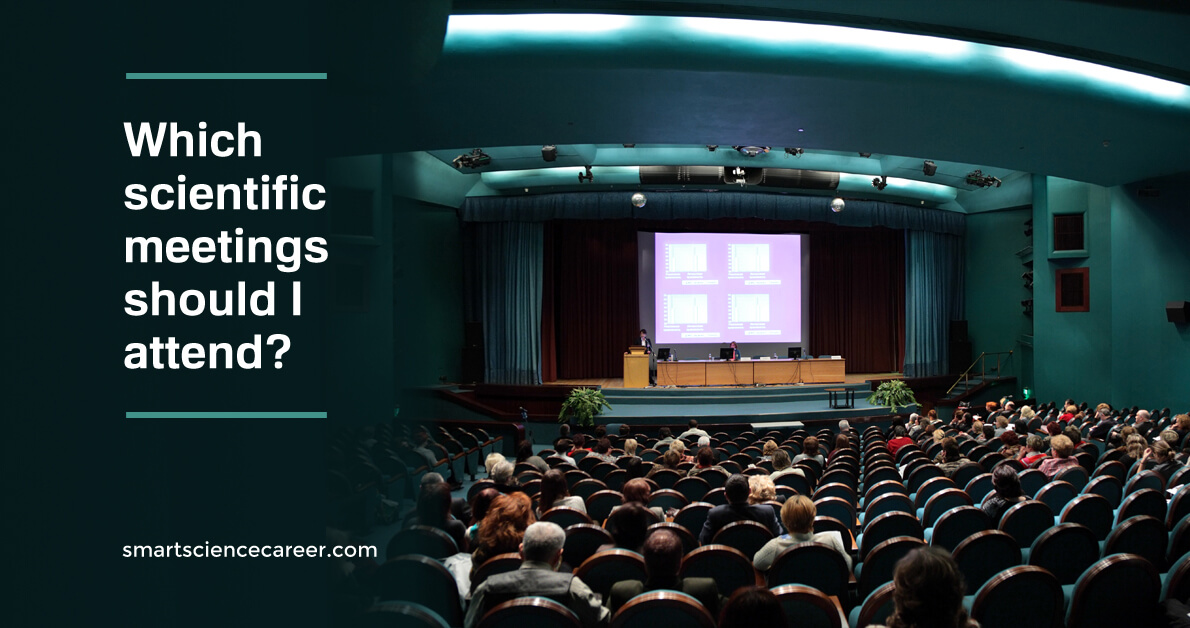Which scientific meetings should I attend?
Attending a scientific meeting can be very inspiring. It may broaden your network and help you to make yourself and your research visible to a broad audience. Nevertheless, it is also often time-consuming and expensive. How do you choose the right scientific meetings to attend?
Why attend scientific conferences/congresses/meetings? Pros and Cons
Attending a conference is expensive
Many scientific congresses are pretty expensive. Even PhD students and postdocs have to pay hundreds of EUR or $$$ to submit an abstract and attend the meeting. Besides, transportation and housing (hotel or Airbnb) must be financed.
Finally, you spend your working time elsewhere, and you are not working in the lab to generate lots and lots of data.
Attending a congress costs time
Every science conference costs a lot of time. You may spend considerable time applying for travel grants. You have to book transportation and hotels, you have to travel to the conference location and back, and you may spend up to a week
Return of investment
Thus, attending a scientific meeting is expensive and costs quite some time. Is it worth it?
At the start of your scientific career, attending a conference is exciting. It may feel like a great adventure to travel to and stay in a foreign country, see the big science stars in person, and breathe the excitement of a big conference with hundreds or thousands of participants.
Some young researchers may find it frightening because they do not know anybody, and maybe they have to present their data for the first time publicly.
After having attended many science meetings, your attitude may change. You may start to see it as a considerable investment of time and money. You go to scientific congresses to meet friends and colleagues.
Conferences are a great opportunity to make yourself and your research visible, to develop scientific independence, to make new connections for potential joint projects or grant proposals and to connect with potential future employers.
In the later stages of your career, you either delegate all the preparation to secretaries or postdocs or let your PhD students and postdocs present posters and give talks.
Or you are an invited speaker (costs will be paid, and travel and hotel will be organized for you). Many senior scientists travel often to give presentations, seminars, or workshops or to organize meetings, consortia, or joint projects.
Therefore, they become more and more selective in which scientific congresses they attend in order to reduce their travel time and time away from home.
Thus, due to the time investment and costs, it is good advice to choose your conferences wisely.
Choosing the best scientific conferences/congresses/meetings
There are many different types of meetings, all with advantages and disadvantages. A huge science conference with 10.000 participants gives you many options and exposes you to world-class speakers and science.
However, you also may feel lost among all these thousands of participants. You may be overwhelmed by the excessive number of talks, posters, and events.
Smaller science meetings may either focus on connecting the international, national, or regional science community, such as the “Annual scientific meeting of the National Society of XYZ research,” or focus on specialized themes for a very selected group of experts, such as “Macrophage phenotypes in the striatum.”
The annual meetings help you connect to future employers and make you visible in the field. The specialized meetings are great for gaining more profound knowledge of your research topic and connecting with the experts to learn and collaborate.
Five easy questions to choose the right scientific congresses
Depending on your goals, the following questions will make it easy to decide whether a congress is relevant to you. A well-prepared answer to each question will make it much easier to say “I will definitely attend the meeting” and to convince a supervisor to pay.
- Will I get exposed to enough relevant information?
- Will I get visibility for myself and my research?
- Will I grow my network? Will I establish new collaborations (grant proposals, joint projects)? Will I become part of a new community?
- Will I connect with future employers?
- Will I have a great tourist experience?
Will I get exposed to enough relevant information?
The keyword is *relevant*.
You should select conferences that are relevant to you and your research right now. I would love to attend every scientific congress, really every meeting in the world, to learn more.
However, “variations of thoracic surgery” are less relevant to me than “microglia subtypes in the hippocampus.” For you, it may be the opposite.
Do not attend scientific congresses because the themes may become relevant in the future. “Just-in-case learning” is less effective than “Just-in-time learning.”
What you need right now will stick in your memory and improve. If you learn about the newest developments and see great lectures about subjects you have always wanted to know better, that would be great.
If you find only a few interesting speakers, no relevant workshops, and entire afternoons irrelevant to you – do not go and find a better science conference.
Will I get visibility for myself and my research?
Conferences are a great opportunity to make yourself and your research visible, to position yourself as an expert in a specific field, and to develop scientific independence.
Presenting your data as a scientific conference presentation or a poster may expose you to inspiring questions and different perspectives. Thus, presenting your data is a great way to get feedback.
However, people may also get “inspired” to publish similar research projects *before* you or steal your ideas. Thus, present only data close to publication to avoid getting scooped.
Anyway, if you can present your data and methods to a relevant group of colleagues, potential future collaborators, or employers, you should definitely attend.
Will I grow my network? Will I establish new collaborations (grant proposals, joint projects)?
Closely linked to the visibility questions is the question about your network. You can build or become part of a community and develop your national and international network. This is vital to developing your science career and to qualify for a professor position.
Connecting with experts in the field is easier during small scientific congresses with a lower number of participants. You may ask questions you always wanted to ask, can show interest in their favorite subjects, and may start joint projects and grant proposals.
You should definitely attend a scientific meeting where you can meet speakers or when many major players in your field are present.
Will I become part of a new community?
In my humble opinion, becoming part of a productive and cooperative community is one of the most inspiring and rewarding experiences in science.
Joining a scientific community not only fosters personal relationships and learning but also significantly contributes to the collaborative advancement of knowledge and innovation.
Will I connect with future employers?
If you are in the late phase of your PhD, postdoc, or tenure track period, you may be interested in letting potential future employers know about your qualifications and interest in a postdoc or faculty position.
This is easily done when talking during a reception or a networking event. Thus, you should definitely attend when many potential future employers in your field are present.
Will I have a great tourist experience?
Many meeting organizers do an excellent job of selecting an attractive location that typically leads to a higher number of participants. Thus, you will enjoy a beautiful place and have more chances to become part of a community, establish future collaborations, and meet future employers.
Should you feel bad about selecting a scientific congress based on touristic attractiveness?
Of course not.
If you can combine a robust learning experience and a great tourist experience, this is great!
In the context of scientific congresses, I have visited many European and US cities and enjoyed the culture, the food, and nature.
However, I handle the first four questions always as priorities and the touristic attractiveness as a bonus. Similarly, when convincing your supervisor or administration to pay for the science conference, it is advisable to focus on the scientific and networking value.
Good answers to these four questions should help you decide and convince a supervisor to pay.
Acknowledgments
I have used AI systems, including Grammarly, Google Gemini, Groq, and ChatGPT, to enhance the English and comprehensiveness of this article. This post may contain affiliate links, meaning I get a small commission if you decide to purchase through my link. Thus, you support smartsciencecareer at no cost to you!
Recommended reading
The following articles may also interest you:
- Am I doing enough for my scientific career?
- Do I really have to work abroad as a scientist?
- Scientific independence – how to develop and demonstrate it?
- What is the best publication strategy in science?
- Do I really have to go to a famous university for a successful career in science?
- Is being a professor worth it?
- What is tenure?





